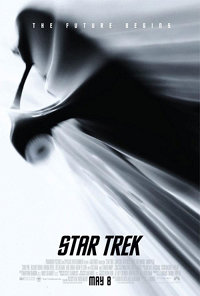Reboot.
 Labelling any fictional universe, any story, any work as a ‘franchise’ couldn’t be considered anything, but demeaning to those that love it. Yet I am lost for words when I try to determine how the Star Trek series of movies and TV episodes could be called.
Labelling any fictional universe, any story, any work as a ‘franchise’ couldn’t be considered anything, but demeaning to those that love it. Yet I am lost for words when I try to determine how the Star Trek series of movies and TV episodes could be called.
After 2002’s ‘Nemesis‘, it was all but clear that the beloved The Next Generation (TNG) crew was long overdue for retirement. One might say that it was apparent well before that movie hit the cinemas; even 1998’s Insurrection lacked the feel and canon that defined the TNG series, the last Star Trek that Gene Roddenberry, Star Trek’s creator, participated in. At the same time, ‘Enterprise’ the latest TV series to hit TVs just after the turn of the century was demonstrably, obviously so far from universe, æsthetics and philosophy of the ‘franchise’; there was little of the sophistication, little of the idealism, little of the sense of responsibility that defined the Star Trek TV series that came in the previous two decades: TNG, Deep Space One and Voyager — The Original Series being the exception, having been created at a time when science fiction on TV was clumsy at best and it being Roddenberry’s first outing — that first attempt, largely devoid of the technical sophistication of its successors, deficient of skill and execution, still included enough of the brilliance of Roddenberry’s universe that would make it successful in the long term; akin in some ways to early adventure computer games: it wasn’t so much the execution/implementation, it was about the concepts, the ideas.
In 2002 the Star Trek universe was dying; lacking direction, vision and the charismatic crew to bring it forward it was more of a rotting ‘franchise’ than art. It made little money to Paramount and there were few ways out of the decay. So, yes: Star Trek needed a reboot. And a reboot it got.
Gene Roddenberry’s Vision. ‘Lost’.
JJ. Abrams is probably best known for ‘Lost’, the successful TV series that essentially realises what could be the TV equivalent of a blended mix of spicy mexican food, profiteroles and lots of alcohol. While undoubtedly ‘talented’ — his direction of Star Trek is at the very least ‘polished’ — he’s also very obviously clueless. Clueless of the universe, the deeper traits that made Kirk, Spock et al. ‘fascinating’. His Star Trek tries to hard to be smart. In the same way ‘Lost’ tries too hard to be smart [and fails miserably]. He’s toying with time-travel [that fantastically popular tool in directors’ sheds as of late], familiar cues and mannerisms from yesteryear, Nimoy’s role — a Star Trekesque hypercameo — and a bunch of ‘borrowed’ scenes, tricks and æsthetics from previous movies [the straight-from-wrath-of-khan alien-bug-that-wraps-around-human-brain and the very Nemesis-like Captain Nero spring immediately to mind].
In many ways Abrams’s Star Trek is refreshing; it is a clear cut from everything that came before it. It skillfully retains the beloved crew of the Original Series, portrayed by beautiful, young actors that are certain to keep [similarly young, new] audiences coming back. It also — somewhat surprisingly — does away with the original TOS timeline and wipes the slate clean for Kirk, Spock et al in a wholly different timeline (I’m curious to see how they’ll follow this up in the years to come).
Abrams has managed to do what was previously considered near impossible. It has rebooted Star Trek in a way that’s certainly going to please quite a few of the fans of the series, more of the fans of the shallow-n-entertaining-action-scifi that seems to have evolved from old school action flicks and science fiction.
Yet, Abrams’s Star Trek is most assuredly not Star Trek. It looks like Star Trek on the surface. Sure, there’s lots in common with TOS too. But this is not the 1960s and the universe has moved on so much since then. At the same time it is missing so much of what made TOS interesting (despite its problems) and practically everything that made TNG one of the best, most popular science fiction series to ever grace the small screen.
At a time when science fiction is defined by subpar condescending soap operas that strive to mix mythology, religion, politics and romance in nonsensical ‘epics’ [BSG anyone?], Abrams Star Trek puts an end to any hope that the brilliance of Roddenberry’s universe is coming back on the big screen [TV or computer screen] anytime soon.
Star Trek is — if it ever wasn’t — a franchise. Correction: it’s a rebooted franchise. I’m guessing it’s gonna be a very successful one too in the years to come. Sadly it will have very little to do with what many of us have come to know and love as Star Trek and what so few other works in late 20th century science fiction have achieved to that scale: the deeper, yet accessible look into important issues and notions challenging civilisations, commonality, ethics. I guess there’s little room for that in today’s scifi anyway.
